CECOS College: Unit 503 Wider Professional Practice Report
VerifiedAdded on 2023/01/05
|6
|1279
|86
Report
AI Summary
This report analyzes the influence of political, social, and economic factors on education policy, exploring their interconnectedness and impact on curriculum. It examines how government policies, societal views, and economic conditions shape educational approaches and resource allocation. The report also discusses the role of stakeholders, including learners, institutions, and external bodies like OFSTED, in managing schools and ensuring quality in education and training. It highlights the importance of stakeholder engagement and the impact of external agencies on program quality and standards, providing insights into effective practices and learner outcomes. The report includes references to relevant literature supporting the analysis of educational practices and policies.
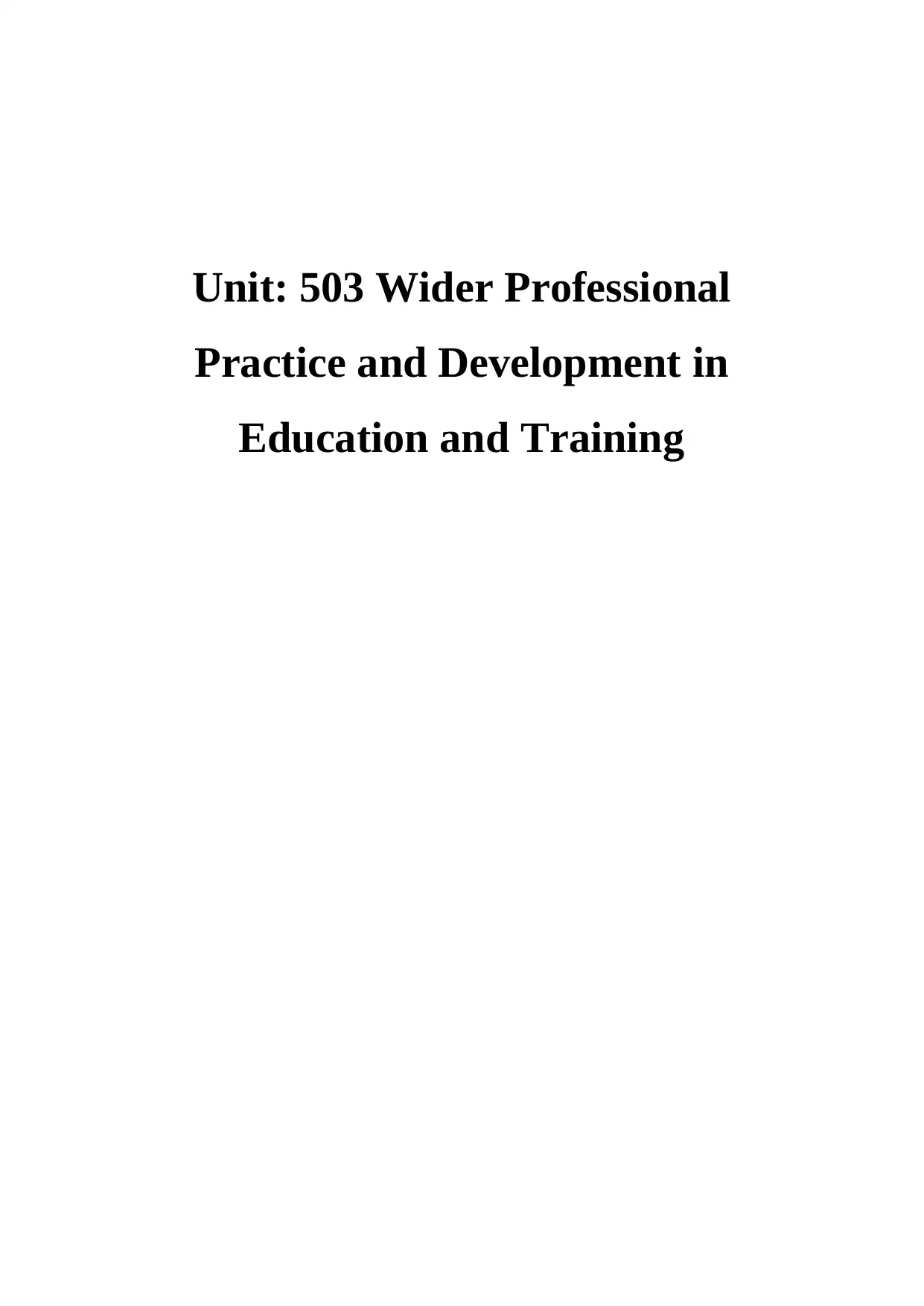
Unit: 503 Wider Professional
Practice and Development in
Education and Training
Practice and Development in
Education and Training
Paraphrase This Document
Need a fresh take? Get an instant paraphrase of this document with our AI Paraphraser
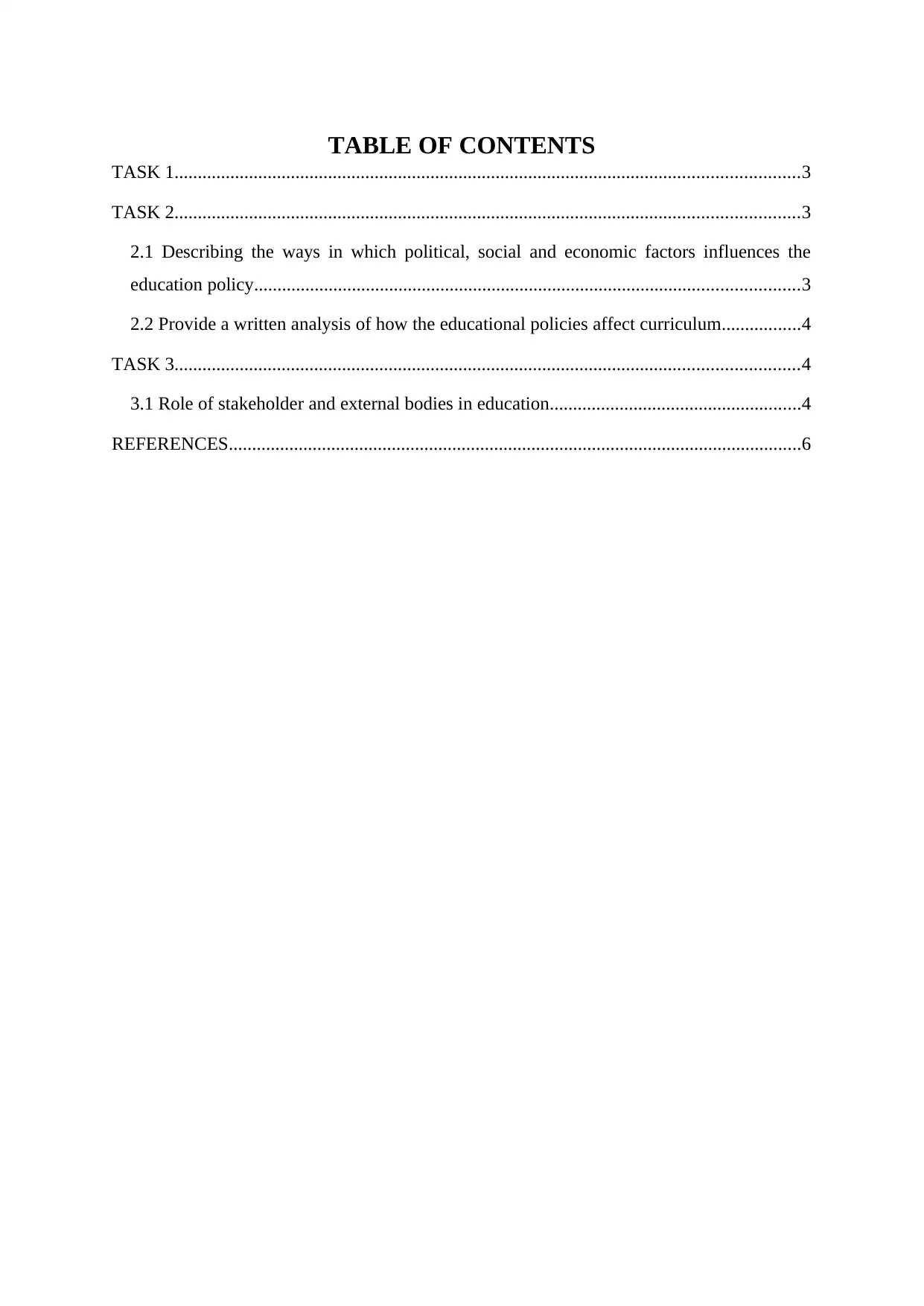
TABLE OF CONTENTS
TASK 1......................................................................................................................................3
TASK 2......................................................................................................................................3
2.1 Describing the ways in which political, social and economic factors influences the
education policy.....................................................................................................................3
2.2 Provide a written analysis of how the educational policies affect curriculum.................4
TASK 3......................................................................................................................................4
3.1 Role of stakeholder and external bodies in education......................................................4
REFERENCES...........................................................................................................................6
TASK 1......................................................................................................................................3
TASK 2......................................................................................................................................3
2.1 Describing the ways in which political, social and economic factors influences the
education policy.....................................................................................................................3
2.2 Provide a written analysis of how the educational policies affect curriculum.................4
TASK 3......................................................................................................................................4
3.1 Role of stakeholder and external bodies in education......................................................4
REFERENCES...........................................................................................................................6
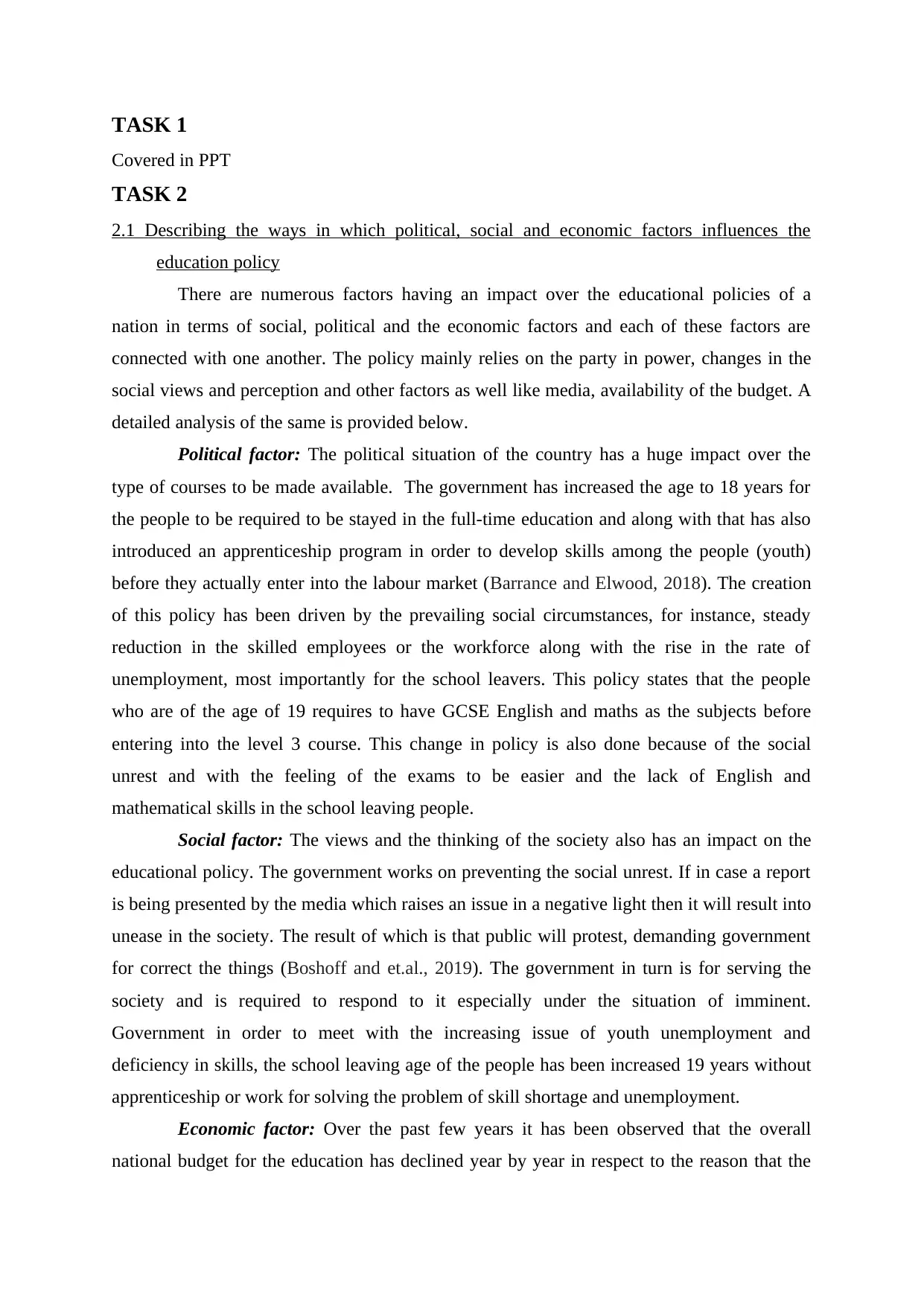
TASK 1
Covered in PPT
TASK 2
2.1 Describing the ways in which political, social and economic factors influences the
education policy
There are numerous factors having an impact over the educational policies of a
nation in terms of social, political and the economic factors and each of these factors are
connected with one another. The policy mainly relies on the party in power, changes in the
social views and perception and other factors as well like media, availability of the budget. A
detailed analysis of the same is provided below.
Political factor: The political situation of the country has a huge impact over the
type of courses to be made available. The government has increased the age to 18 years for
the people to be required to be stayed in the full-time education and along with that has also
introduced an apprenticeship program in order to develop skills among the people (youth)
before they actually enter into the labour market (Barrance and Elwood, 2018). The creation
of this policy has been driven by the prevailing social circumstances, for instance, steady
reduction in the skilled employees or the workforce along with the rise in the rate of
unemployment, most importantly for the school leavers. This policy states that the people
who are of the age of 19 requires to have GCSE English and maths as the subjects before
entering into the level 3 course. This change in policy is also done because of the social
unrest and with the feeling of the exams to be easier and the lack of English and
mathematical skills in the school leaving people.
Social factor: The views and the thinking of the society also has an impact on the
educational policy. The government works on preventing the social unrest. If in case a report
is being presented by the media which raises an issue in a negative light then it will result into
unease in the society. The result of which is that public will protest, demanding government
for correct the things (Boshoff and et.al., 2019). The government in turn is for serving the
society and is required to respond to it especially under the situation of imminent.
Government in order to meet with the increasing issue of youth unemployment and
deficiency in skills, the school leaving age of the people has been increased 19 years without
apprenticeship or work for solving the problem of skill shortage and unemployment.
Economic factor: Over the past few years it has been observed that the overall
national budget for the education has declined year by year in respect to the reason that the
Covered in PPT
TASK 2
2.1 Describing the ways in which political, social and economic factors influences the
education policy
There are numerous factors having an impact over the educational policies of a
nation in terms of social, political and the economic factors and each of these factors are
connected with one another. The policy mainly relies on the party in power, changes in the
social views and perception and other factors as well like media, availability of the budget. A
detailed analysis of the same is provided below.
Political factor: The political situation of the country has a huge impact over the
type of courses to be made available. The government has increased the age to 18 years for
the people to be required to be stayed in the full-time education and along with that has also
introduced an apprenticeship program in order to develop skills among the people (youth)
before they actually enter into the labour market (Barrance and Elwood, 2018). The creation
of this policy has been driven by the prevailing social circumstances, for instance, steady
reduction in the skilled employees or the workforce along with the rise in the rate of
unemployment, most importantly for the school leavers. This policy states that the people
who are of the age of 19 requires to have GCSE English and maths as the subjects before
entering into the level 3 course. This change in policy is also done because of the social
unrest and with the feeling of the exams to be easier and the lack of English and
mathematical skills in the school leaving people.
Social factor: The views and the thinking of the society also has an impact on the
educational policy. The government works on preventing the social unrest. If in case a report
is being presented by the media which raises an issue in a negative light then it will result into
unease in the society. The result of which is that public will protest, demanding government
for correct the things (Boshoff and et.al., 2019). The government in turn is for serving the
society and is required to respond to it especially under the situation of imminent.
Government in order to meet with the increasing issue of youth unemployment and
deficiency in skills, the school leaving age of the people has been increased 19 years without
apprenticeship or work for solving the problem of skill shortage and unemployment.
Economic factor: Over the past few years it has been observed that the overall
national budget for the education has declined year by year in respect to the reason that the
⊘ This is a preview!⊘
Do you want full access?
Subscribe today to unlock all pages.

Trusted by 1+ million students worldwide
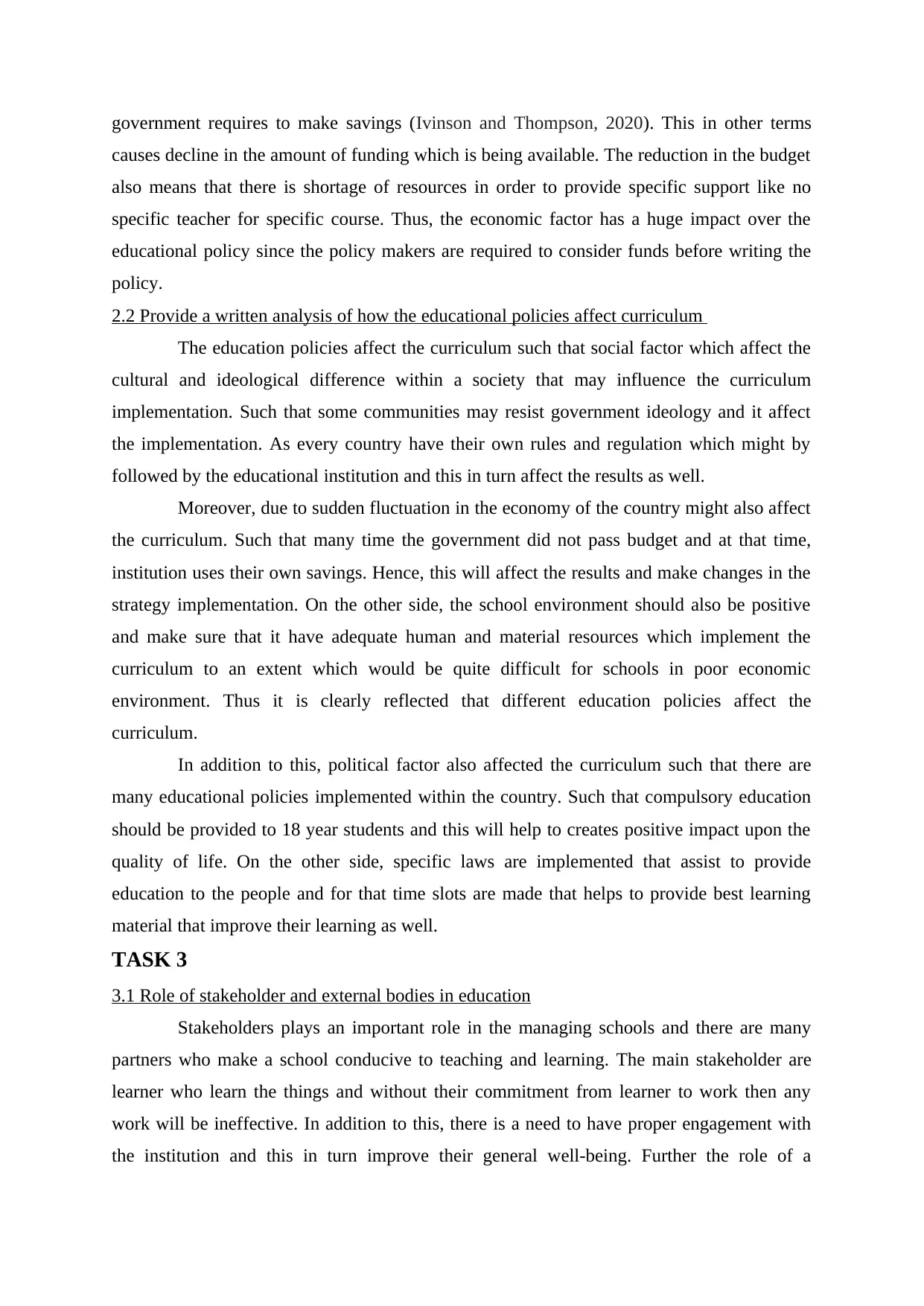
government requires to make savings (Ivinson and Thompson, 2020). This in other terms
causes decline in the amount of funding which is being available. The reduction in the budget
also means that there is shortage of resources in order to provide specific support like no
specific teacher for specific course. Thus, the economic factor has a huge impact over the
educational policy since the policy makers are required to consider funds before writing the
policy.
2.2 Provide a written analysis of how the educational policies affect curriculum
The education policies affect the curriculum such that social factor which affect the
cultural and ideological difference within a society that may influence the curriculum
implementation. Such that some communities may resist government ideology and it affect
the implementation. As every country have their own rules and regulation which might by
followed by the educational institution and this in turn affect the results as well.
Moreover, due to sudden fluctuation in the economy of the country might also affect
the curriculum. Such that many time the government did not pass budget and at that time,
institution uses their own savings. Hence, this will affect the results and make changes in the
strategy implementation. On the other side, the school environment should also be positive
and make sure that it have adequate human and material resources which implement the
curriculum to an extent which would be quite difficult for schools in poor economic
environment. Thus it is clearly reflected that different education policies affect the
curriculum.
In addition to this, political factor also affected the curriculum such that there are
many educational policies implemented within the country. Such that compulsory education
should be provided to 18 year students and this will help to creates positive impact upon the
quality of life. On the other side, specific laws are implemented that assist to provide
education to the people and for that time slots are made that helps to provide best learning
material that improve their learning as well.
TASK 3
3.1 Role of stakeholder and external bodies in education
Stakeholders plays an important role in the managing schools and there are many
partners who make a school conducive to teaching and learning. The main stakeholder are
learner who learn the things and without their commitment from learner to work then any
work will be ineffective. In addition to this, there is a need to have proper engagement with
the institution and this in turn improve their general well-being. Further the role of a
causes decline in the amount of funding which is being available. The reduction in the budget
also means that there is shortage of resources in order to provide specific support like no
specific teacher for specific course. Thus, the economic factor has a huge impact over the
educational policy since the policy makers are required to consider funds before writing the
policy.
2.2 Provide a written analysis of how the educational policies affect curriculum
The education policies affect the curriculum such that social factor which affect the
cultural and ideological difference within a society that may influence the curriculum
implementation. Such that some communities may resist government ideology and it affect
the implementation. As every country have their own rules and regulation which might by
followed by the educational institution and this in turn affect the results as well.
Moreover, due to sudden fluctuation in the economy of the country might also affect
the curriculum. Such that many time the government did not pass budget and at that time,
institution uses their own savings. Hence, this will affect the results and make changes in the
strategy implementation. On the other side, the school environment should also be positive
and make sure that it have adequate human and material resources which implement the
curriculum to an extent which would be quite difficult for schools in poor economic
environment. Thus it is clearly reflected that different education policies affect the
curriculum.
In addition to this, political factor also affected the curriculum such that there are
many educational policies implemented within the country. Such that compulsory education
should be provided to 18 year students and this will help to creates positive impact upon the
quality of life. On the other side, specific laws are implemented that assist to provide
education to the people and for that time slots are made that helps to provide best learning
material that improve their learning as well.
TASK 3
3.1 Role of stakeholder and external bodies in education
Stakeholders plays an important role in the managing schools and there are many
partners who make a school conducive to teaching and learning. The main stakeholder are
learner who learn the things and without their commitment from learner to work then any
work will be ineffective. In addition to this, there is a need to have proper engagement with
the institution and this in turn improve their general well-being. Further the role of a
Paraphrase This Document
Need a fresh take? Get an instant paraphrase of this document with our AI Paraphraser
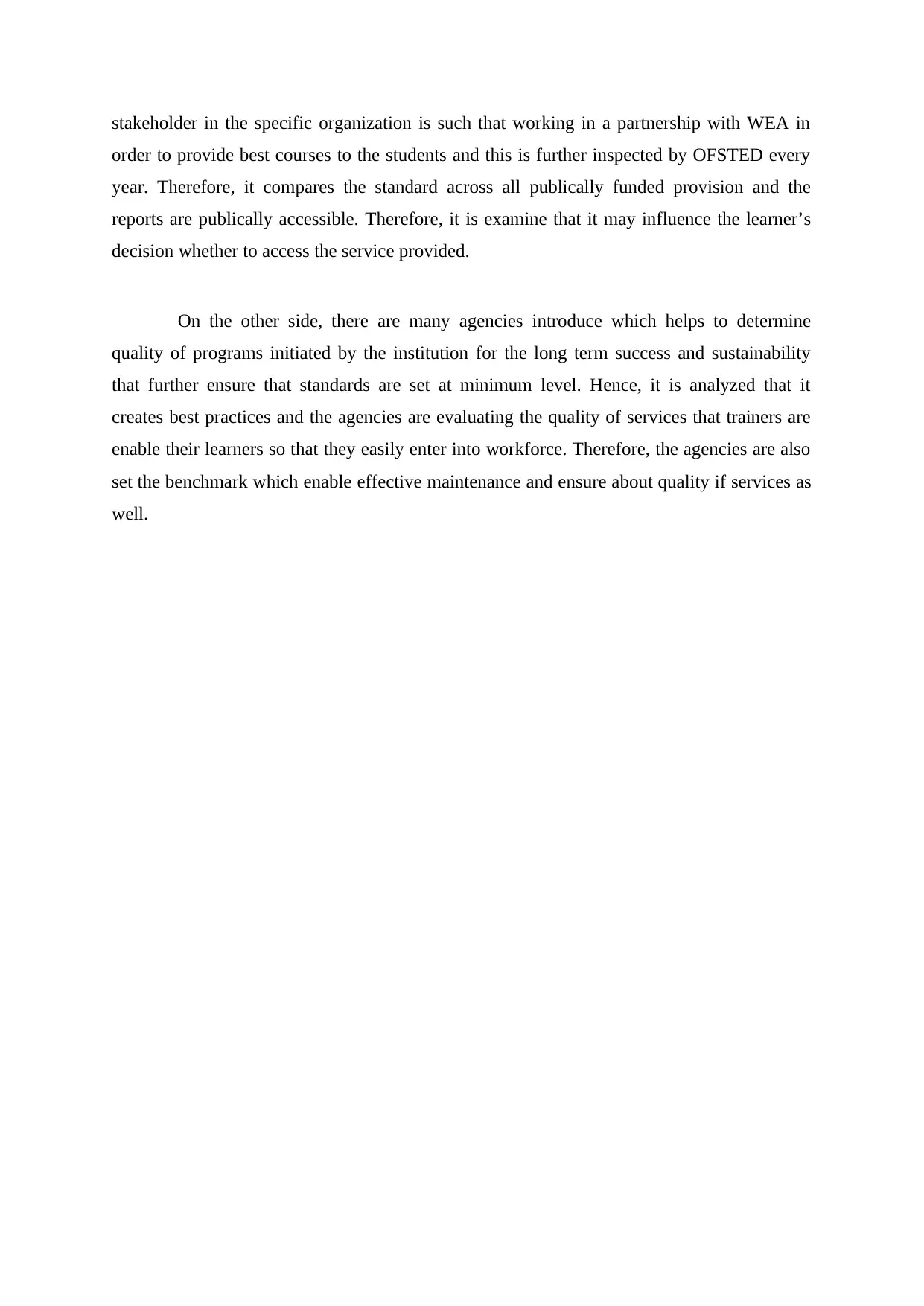
stakeholder in the specific organization is such that working in a partnership with WEA in
order to provide best courses to the students and this is further inspected by OFSTED every
year. Therefore, it compares the standard across all publically funded provision and the
reports are publically accessible. Therefore, it is examine that it may influence the learner’s
decision whether to access the service provided.
On the other side, there are many agencies introduce which helps to determine
quality of programs initiated by the institution for the long term success and sustainability
that further ensure that standards are set at minimum level. Hence, it is analyzed that it
creates best practices and the agencies are evaluating the quality of services that trainers are
enable their learners so that they easily enter into workforce. Therefore, the agencies are also
set the benchmark which enable effective maintenance and ensure about quality if services as
well.
order to provide best courses to the students and this is further inspected by OFSTED every
year. Therefore, it compares the standard across all publically funded provision and the
reports are publically accessible. Therefore, it is examine that it may influence the learner’s
decision whether to access the service provided.
On the other side, there are many agencies introduce which helps to determine
quality of programs initiated by the institution for the long term success and sustainability
that further ensure that standards are set at minimum level. Hence, it is analyzed that it
creates best practices and the agencies are evaluating the quality of services that trainers are
enable their learners so that they easily enter into workforce. Therefore, the agencies are also
set the benchmark which enable effective maintenance and ensure about quality if services as
well.
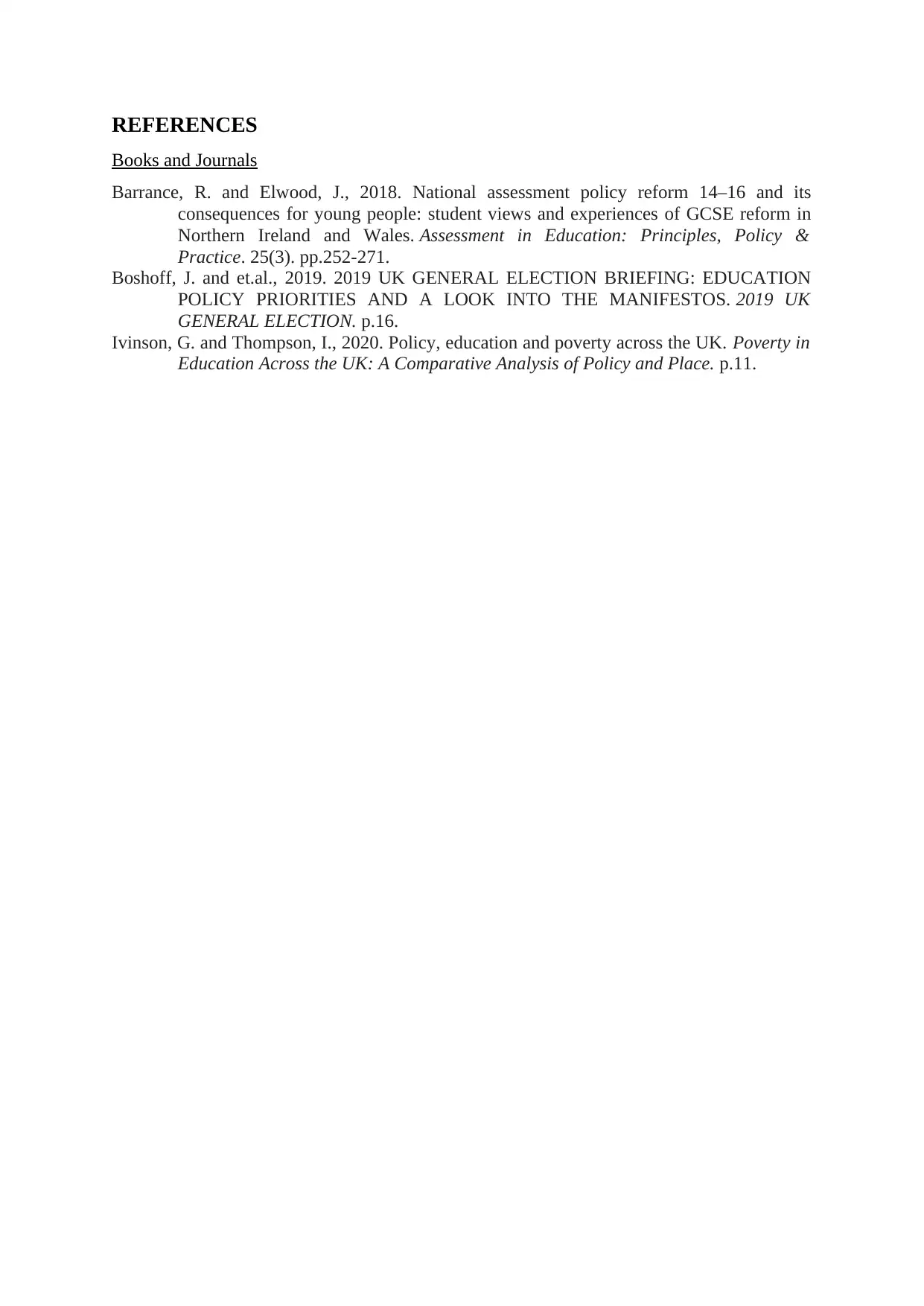
REFERENCES
Books and Journals
Barrance, R. and Elwood, J., 2018. National assessment policy reform 14–16 and its
consequences for young people: student views and experiences of GCSE reform in
Northern Ireland and Wales. Assessment in Education: Principles, Policy &
Practice. 25(3). pp.252-271.
Boshoff, J. and et.al., 2019. 2019 UK GENERAL ELECTION BRIEFING: EDUCATION
POLICY PRIORITIES AND A LOOK INTO THE MANIFESTOS. 2019 UK
GENERAL ELECTION. p.16.
Ivinson, G. and Thompson, I., 2020. Policy, education and poverty across the UK. Poverty in
Education Across the UK: A Comparative Analysis of Policy and Place. p.11.
Books and Journals
Barrance, R. and Elwood, J., 2018. National assessment policy reform 14–16 and its
consequences for young people: student views and experiences of GCSE reform in
Northern Ireland and Wales. Assessment in Education: Principles, Policy &
Practice. 25(3). pp.252-271.
Boshoff, J. and et.al., 2019. 2019 UK GENERAL ELECTION BRIEFING: EDUCATION
POLICY PRIORITIES AND A LOOK INTO THE MANIFESTOS. 2019 UK
GENERAL ELECTION. p.16.
Ivinson, G. and Thompson, I., 2020. Policy, education and poverty across the UK. Poverty in
Education Across the UK: A Comparative Analysis of Policy and Place. p.11.
⊘ This is a preview!⊘
Do you want full access?
Subscribe today to unlock all pages.

Trusted by 1+ million students worldwide
1 out of 6
Related Documents
Your All-in-One AI-Powered Toolkit for Academic Success.
+13062052269
info@desklib.com
Available 24*7 on WhatsApp / Email
![[object Object]](/_next/static/media/star-bottom.7253800d.svg)
Unlock your academic potential
Copyright © 2020–2026 A2Z Services. All Rights Reserved. Developed and managed by ZUCOL.



